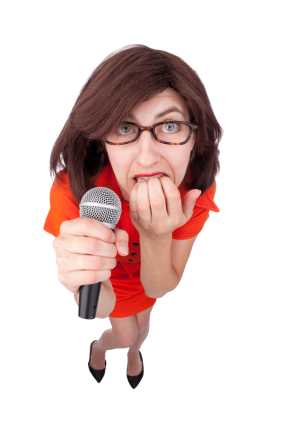 Public speaking anxiety is a real problem. This is a guest post written by Ryan Rivera, I strongly recommend you check out his website at www.calmclinic.com. Ryan Rivera suffered from severe anxiety, and public speaking only made it worse. He shares tips on reducing all anxiety on his site. As public speaking is one of the most anxiety generating activities we undertake, I thought it would be a great to let Ryan, an expert in anxiety, talk through his strategies. Don’t forget, Manchester Psychotherapy can help you with your anxiety too.
Public speaking anxiety is a real problem. This is a guest post written by Ryan Rivera, I strongly recommend you check out his website at www.calmclinic.com. Ryan Rivera suffered from severe anxiety, and public speaking only made it worse. He shares tips on reducing all anxiety on his site. As public speaking is one of the most anxiety generating activities we undertake, I thought it would be a great to let Ryan, an expert in anxiety, talk through his strategies. Don’t forget, Manchester Psychotherapy can help you with your anxiety too.
Back in my youth, it wasn’t just public speaking that caused me anxiety. I had anxiety sitting in a chair doing nothing, occupied by nothing by my own thoughts. So when it came to public speaking, it was more than just anxiety. It was terror. Public speaking was like standing in front of a firing squad, except I wanted them to fire so the entire experience would be over.
So it’s no wonder that when I started to combat my anxiety, one of the hardest fears to overcome was public speaking. It’s everyone’s fear, and it’s arguably one of the most problematic social phobias that exist in the world today.
What to Do to Reduce Your Public Speaking Anxiety
There’s some good news, and some bad news. The good news is that the best methods to reduce anxiety are relatively easy to understand. The bad news is that they are harder for people to implement, and often take time and dedication in order to reduce them completely.
Before the Big Day
- Practice
I’m almost embarrassed to list this one, but let’s be honest, how much do you REALLY practice? Do you read your notecards one or two times? Do you practice one or two times all the way through the speech? I, myself, would read through the entire speech with an audience of someone I trust three times, and consider that a victory. But why three? That number is completely arbitrary. You can always practice more, and if you’re concerned about being nervous, you should. The more you practice, the more comfortable you’ll be with the entire speech, and the easier it will be for you to find your place if you get nervous/lost.
- Relaxation Strategies
My personal favorite thing to do before a speech is to integrate relaxation strategies. I remember I had to give this large speech in front of an audience of potential clients for a project I was working on, and a few days before the speech began I started to feel unspeakably nervous. So I decided to integrate my relaxation techniques. My own personal techniques were to use autogenic training and deep breathing (two well-known relaxation strategies). Both take only a few minutes. I also found skipping stones to be soothing, so I head to a nearby park to skip stones. There are plenty of pre-made relaxation strategies, but if you find something that relaxes you (that is healthy for your mind and body), you should use it.
- Sleep Well
Physical anxiety can actually lead to real anxiety. I’ve done a good job controlling my anxiety over the course of my life, but if I don’t get a full night’s sleep, it still comes back once in a while. Always make sure you’re sleeping well before a big speech or presentation.
The Day of the Speech
One of the things I’ve found most interesting is that on the day of any presentation I almost always woke up feeling completely alert. It was like my body wanted me to be ready for the big day. But then, as usual, the fear started to creep in.
On the day of the speech, the best thing you can do is prepare everything you need. Make sure you’ve set up your physical space, and that all of the papers you need are in place. You should also eat a healthy meal, make sure you’ve had enough water, and continue any relaxation exercises you can complete as you prepare for the speech. The big day is already there, so the key is trying to avoid allowing the anxiety to increase its intensity too strongly.
During the Speech
Here’s a handy little tip I learned from two different public speaking appearances – always start strong. Public speaking involves a lot of rhythm, so you need to make sure you start your speech loud and clear. My tendency when I was suffering from more anxiety was to start quietly and hope I felt more comfortable over time. That never works. Start loud, like you’re ready to deliver the speech and you’re more likely to get into the rhythm.
After the Speech
For those with fear of public speaking, the biggest problem isn’t always before the speech – it’s after. You spend the next hour going over every “um” and trying to re-imagine the faces in the audience to see how bored or annoyed they were. But these types of negative thoughts only contribute to public speaking anxiety, and not only are they not helpful – they’re often not true, and had no effect on your speech.
So rather than focus on anything negative about your speech, take out a piece of paper and write about all of the things you went well. It doesn’t matter if you cried on stage from the fright – chances are there are aspects of the presentation you did very well, and you should focus on those, since in the long term those are the only aspects of public speaking that are important.
Also, continue to address any additional anxiety you have, especially if you have an anxiety disorder. I know that my anxiety outside of public speaking drastically influenced my public speaking anxiety, so in a way, combatting my everyday anxiety was contributing to my ability to speak.
Becoming a Great Public Speaker with low public speaking anxiety
You can’t expect to be a great public speaker overnight. But you can use the above tools to make public speaking easier and, over time, you’ll find that you no longer experience much public speaking anxiety at all.
 Tomorrow never comes, yet we wait until tomorrow for happiness, fulfillment, intimacy and closeness. How many times have you said something like “when my anxiety reduces a bit I’ll make more effort with my partner” or “when I feel less stressed I’ll stop smoking/drinking/shouting” (insert as appropriate)? But tomorrow never comes. The problem with “when” statements is that they usually tie up your goal so tightly that you never reach it, a bit like one of those big balls of sticky tape that are impossible to unwrap.
Tomorrow never comes, yet we wait until tomorrow for happiness, fulfillment, intimacy and closeness. How many times have you said something like “when my anxiety reduces a bit I’ll make more effort with my partner” or “when I feel less stressed I’ll stop smoking/drinking/shouting” (insert as appropriate)? But tomorrow never comes. The problem with “when” statements is that they usually tie up your goal so tightly that you never reach it, a bit like one of those big balls of sticky tape that are impossible to unwrap. Anger as an emotion has had a great deal of bad press through the years. It’s one of those emotions that people shy away from and never really use to describe anyone in a positive light. Anger is, however, just another emotion.
Anger as an emotion has had a great deal of bad press through the years. It’s one of those emotions that people shy away from and never really use to describe anyone in a positive light. Anger is, however, just another emotion.